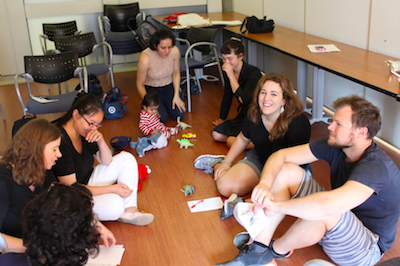Navigating student life at McGill can be challenging for anyone. Academic and social pressures can be taxing and dominate many of the decisions students make. For those who are also parents, the lack of services McGill offers to support them magnifies the specific dificulties they face navigating university.
“It is very isolating to be a student parent,” Olivia Kurajian, U3 Arts and mother to a two year old daughter, said. “I believe we have a huge shortage of childcare on campus, [and] it’s really hazy [as to] how student parents should navigate their personal and academic responsibilities.”
In an attempt to address these issues, the Social Equity and Diversity Education Office (SEDE) launched the Family Care program in 2015. The program, which was funded by both the Sustainability Projects Fund and the Senate Subcommittee on Women, works towards tackling the challenges caregivers face on campus. According to Ananya Nair, U1 Arts and an executive member of the club, the club aims to alleviate parents’ stress by expanding access to daycare and advocating for family-friendly residence options.
“We want to expand into other aspects [and] include not only babysitting, but other childcare services too,” Nair said.
The SSMU Babysitting Club, soon to be renamed SSMU Childcare Collective in order to advocate for a broader range of services, was originally created by SSMU to provide free babysitting to students who are in need of child care. The organization is looking for new ways to expand both in size and scope to meet more of the pressing needs student parents face.
“In the past, we’ve had to cancel events because there were not enough volunteers,” Nair said.
Among its initiatives, the SSMU Babysitting Club provides on-campus childcare services to student parents and collaborates with the Post-Graduate Students’ Society (PGSS) on Study Sundays, a weekly program where student parents can complete their academic work on campus while volunteers take care of their children. The club also wants to launch a program that pairs volunteers with student parents to provide one-on-one domestic support.
“This club gives agency to student parents who are left on the sidelines,” Kurajian said. “We are not a ton [of students] and are spread out in undergrad and postgrad, so, it’s hard to address [all of our needs], especially when the communication doesn’t expand throughout the different faculties and associations.”
Although it provides a necessary service to guardians, the SSMU Babysitting Club is restricted by its status on many accounts. As such, it is looking to be converted into a service.
“This would make McGill more inclusive and child accessible,” Nair said. “[The organization could] get actual funding from SSMU [and] apply for space, [as] there is currently no space provided for childcare. With more funding, we can actively get more students to be a part of this [and work towards] solving this [break] between student parents and McGill services.”
Additionally, although SEDE’s services provide a necessary mechanism of support, many student parents believe the administration still needs to make progress. Many members of the student parent community hope that the university will address its lack of policies concerning pregnancy, breastfeeding, and missing exams because of complications with child-care.
“On a personal level, I have been very lucky, and my professors have been accommodating [with my child and I],” Kurajian said. “But, anytime I have a time-conflict issue, I was referred to the Office of Disabilities. This is disheartening because I don’t think [having a] daughter classifies as any type of disability. In fact, I have earned better grades in the past two years and wake up with ambition to go to school. She has really enhanced my commitment [… to] school.”
In addition to the services offered by SEDE, student parents believe there should be more spaces, both physical—such as breastfeeding stations—and psychological, listen to the voices of student guardians.
While progress has been made, student parents still require more assistance in order to get the most out of their times at McGill.
“I don’t understand why being a research university has to contradict or be at odds with [students] having families because a lot of times, […] we [are] more focused and better students after we [have] our kids,” Kurajian said. “We are setting an example for our kids. McGill is missing out on unique perspectives and a lot of talent by not catering to student parents.”








